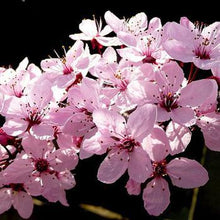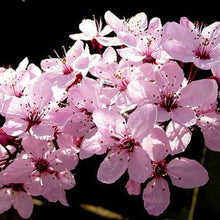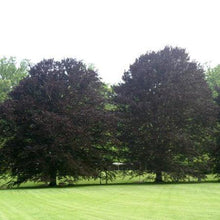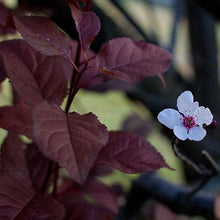Add an explosion of color to your landscape
The Krauter Vesuvius Plum, or the ‘KV Plum’, is quickly growing in popularity because it has multiple seasons of head turning color to stand out as the prettiest tree in the neighborhood, and they also produce tons of delicious cherry plums.
In the spring, Krauter Vesuvius leaves emerge with a unique shade of dark purple that they keep all season, then hundreds of soft pink blossoms erupt all over the canopy to create a stunning display of contrasting colors. In the fall, bright red plums about the size of cherries brighten up the landscape even more.
By only growing 15 to 20 feet, the Krauter Vesuvius Plum tree can fit anywhere, even in yards with limited space. Their perfectly oval shaped canopies add ornamental value to the landscape, and also provide shade to relax in. You can strategically place your plum trees by your drive way or home to keep certain areas cool during summer days with blistering heat.
Krauter Vesuvius Plums are recommended for growing zones 4 through 9, meaning they will thrive during the extremely cold and snowy winters up north as well as the hot and dry climates down south.
While being cold hardy and drought tolerant, this plum variety is most importantly smog and pollution tolerant. They are an excellent choice for large urban areas and will filter and clean toxins out of the air so you can breathe easy while enjoying the Krauter Vesuvius’s vivid color and irresistible cherry plums.
Planting & Care
Choosing a location: Your flowering plum tree will prefer a full sun location but will do well if planted where it will receive morning sun and afternoon shade. The tree will not grow as quickly if there is too much shade. They are non-invasive which makes them a great option for planting close to your home but avoid areas of standing water and poor drainage.
Planting directions: The KV is known to be an air filtration tree cleaning the toxins from the air so they can be planted close to a road without fear of pollution causing them harm.
1) Make your hole twice the width of the root ball and just as deep.
2) Gently comb the edges of the root ball to free up the roots a bit and position them downward in the hole so they can establish properly.
3) As you begin to backfill the hole, stop every so often to add water. This will help settle the soil and prevent air pockets from forming.
4) Spread a 3 inch layer of organic mulch every spring season. It breaks down each year so it will need to be renewed.
Watering: Provide adequate watering for the first couple seasons to be sure the tree establishes itself properly. It will need to be watered weekly, but you may need to do it a bit more often in the hotter season. Take care not to over do it, the flowering plum is quite adaptable but is susceptible to root rot if the soil becomes overly saturated. Mulching helps retain the soil moisture while keeping competitive weeds at bay.
Pruning: KV Plums have a naturally rounded shape that will not require regular pruning but an annual trimming of the branch tips will encourage dense growth and more branching. Prune during the winter dormant months at a 45 degree angle using a sterilized pair of cutters. You can use a household rubbing alcohol to clean your cutting tool.
Fertilizing: Feed your tree in the spring with a general, all purpose fertilizer before the new growth starts.
Pests and problems: The KV plum is indeed a beautiful tree but may encounter an occasional issue with fungus such as powdery mildew and leaf spot. They rarely will harm the tree but can be avoided by making sure you clear away fallen leaves and debris. Also try to water right at the base of the tree to prevent fungus issues from forming.
Borers, aphids and leafhoppers can cause brown foliage and a loss of new growth but can be controlled. Horticultural oil can be used to control the borers. Neem oil and insecticidal soap can treat the aphids and other soft-bodied pests.







